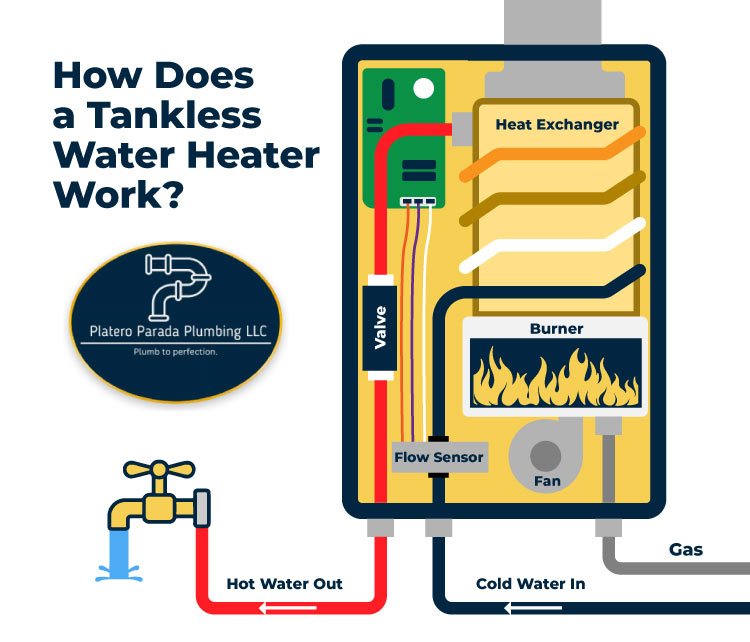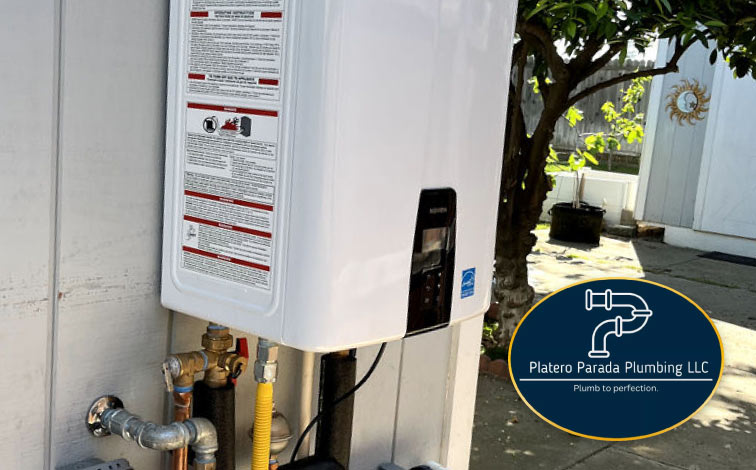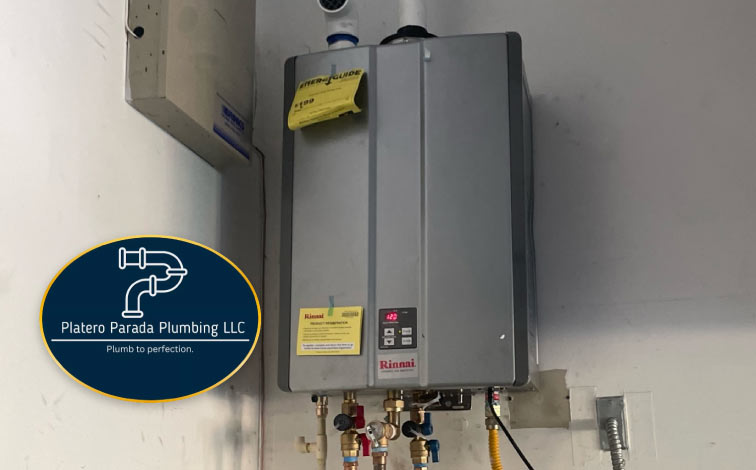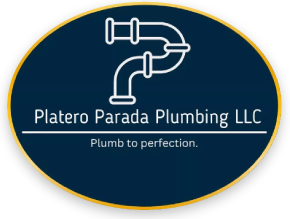Ever wished you had truly endless hot water for your morning shower, even after everyone else in the house has used it? Or perhaps you’re tired of high energy bills from constantly heating a tank of water you don’t always need?
Enter the tankless water heater—a revolutionary system that’s rapidly gaining popularity for its efficiency and compact design. But beyond the hype, how does a tankless water heater work its magic, delivering hot water on demand? This guide will dive into the fascinating mechanics behind these innovative units, exploring their benefits, installation costs, and everything else you need to know.

Table of Contents
How Does a Tankless Water Heater Work?
How It Works
1. Activation – When a hot water tap is turned on, a flow sensor detects water movement and signals the unit to start heating.
2. Heat Exchanger – The system uses a heat exchanger, which is a compact metal block with copper or stainless steel tubing coiled inside. The burner ignites, and heat transfers through the tubing, rapidly increasing the water temperature.
3. Temperature Adjustment – A thermostatic control ensures the outgoing water reaches the set temperature, typically around 120°F. The unit adjusts the gas flow and burner intensity based on the incoming water temperature.
4. Delivery – The now-heated water flows out to the faucet, shower, or appliance. When you turn on a hot water tap, cold water travels through a heat exchanger, where it is rapidly heated before reaching your faucet or shower. Since there is no storage tank, hot water is provided instantly and continuously.
Key Components of a Tankless Water Heater:
- Heat Exchanger: The core of the system where water is heated.
- Flow Sensor: Detects when water starts flowing and activates the heating process.
- Burners or Electric Elements: Heat the water as it passes through the unit.
- Control Panel: Regulates temperature and safety features.
Key Differences from a Traditional Water Heater:
- No Storage Tank – A tank-style heater keeps a supply of hot water, while a tankless unit heats only when needed.
- Energy Efficiency – Since tankless systems don’t keep water hot 24/7, they are more efficient and can reduce energy costs.
- Endless Hot Water – As long as the unit is correctly sized and gas/electricity is supplied, hot water won’t run out.
Types of Tankless Water Heaters:
- Gas-Powered: Uses natural gas or propane to heat water efficiently.
- Electric-Powered: Utilizes electric heating elements, ideal for smaller households or areas without gas lines.

Benefits of a Tankless Water Heater
1. Endless Hot Water: Traditional water heaters can run out of hot water, but a tankless system provides a continuous supply.
2. Energy Efficiency: Tankless water heaters only heat water when needed, reducing energy consumption and lowering utility bills.
3. Space-Saving Design: Without a bulky storage tank, these units take up less space, making them ideal for small homes or apartments.
4. Longer Lifespan: Tankless water heaters can last up to 20 years, compared to 10-15 years for traditional models.
5. Lower Risk of Leaks and Water Damage: Since there is no tank to store water, the risk of leaks and water damage is significantly reduced.
How to Install a Tankless Hot Water Heater
Installing a tankless water heater requires plumbing and electrical expertise. It’s best to hire a professional like Platero Parada Plumbing to ensure proper installation. Here’s a general installation process:
- Choose the Right Size – Determine the flow rate and temperature rise required for your household.
- Turn Off Utilities – Shut off water and power/gas connections.
- Mount the Unit – Secure the heater to the wall in a well-ventilated area.
- Connect Water Lines – Attach cold and hot water pipes securely.
- Connect Gas or Electricity – Ensure proper ventilation for gas models.
- Test the System – Check for leaks and adjust temperature settings.
For installation, Platero Parada Plumbing offers professional Tankless Water Heater services.

How to Flush a Tankless Water Heater
Regular maintenance extends the lifespan of your tankless water heater. Flushing the system removes mineral buildup that can hinder performance. Follow these steps:
- Turn Off the Power and Water Supply
- Connect a Pump and Hoses to the inlet and outlet valves.
- Use a Descaling Solution and circulate it through the unit for 45 minutes.
- Flush with Clean Water to remove any remaining solution.
- Restore Power and Test the heater for proper operation.
What Size Tankless Water Heater Do I Need?
Choosing the right size depends on your household’s hot water demand. Consider:
- Flow Rate (GPM): Measure the gallons per minute (GPM) needed for showers, sinks, and appliances.
- Temperature Rise: Determine the difference between incoming cold water and desired hot water temperature.
- Household Size: A small unit may suffice for a single bathroom, while larger homes need a higher capacity model.
Need help selecting the right unit? Contact Platero Parada Plumbing for expert guidance.

How Much to Install a Tankless Water Heater?
Installation costs vary based on factors like unit type, labor, and any necessary upgrades. On average:
- Gas Models: $2,000 – $4,500 (including installation)
- Electric Models: $1,000 – $3,000
- Additional Costs: Venting, gas line modifications, or electrical upgrades may add to the total.
FAQs About How Does a Tankless Water Heater Work
Do tankless water heaters work in cold climates?
Yes, but they may require a higher BTU unit to compensate for colder incoming water temperatures.
Can a tankless water heater supply multiple fixtures at once?
Yes, but you must choose a unit with the appropriate flow rate to meet demand.
How long does a tankless water heater last?
With proper maintenance, a tankless water heater can last up to 20 years.
Are tankless water heaters worth the investment?
Yes! They offer long-term energy savings, endless hot water, and a longer lifespan.
Do tankless water heaters require regular maintenance?
Yes, flushing the unit annually prevents mineral buildup and maintains efficiency.
Platero Parada Plumbing offers 24/7 professional water heater services in Sacramento, Yolo, and Placer Counties. Whether you need installation, maintenance, or emergency repairs, our experienced team is ready to help. Contact us today to learn more about how does a tankless water heater works and don’t forget to follow us on Facebook!

